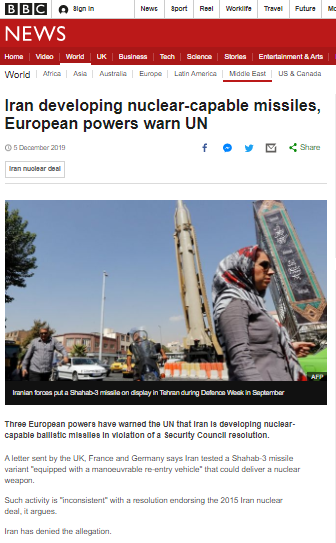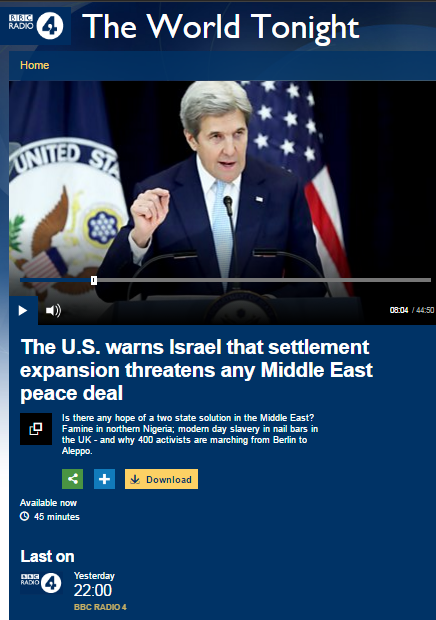On December 5th a report headlined “Iran developing nuclear-capable missiles, European powers warn UN” was published on the BBC News website’s ‘Middle East’ page.
“Three European powers have warned the UN that Iran is developing nuclear-capable ballistic missiles in violation of a Security Council resolution.
A letter sent by the UK, France and Germany says Iran tested a Shahab-3 missile variant “equipped with a manoeuvrable re-entry vehicle” that could deliver a nuclear weapon.
Such activity is “inconsistent” with a resolution endorsing the 2015 Iran nuclear deal, it argues.”
It would of course have been helpful to readers had it been pointed out at that stage in the report that the UK, France and Germany – also known as the E3 – were part of the P5+1 which negotiated the JCPOA with Iran. However that information was only revealed three paragraphs from the end:
“The five other parties to the deal – the UK, France, Germany, China and Russia – have tried to keep it alive.”
Readers were told that:
“Iran has breached a number of commitments under the deal in recent months in response to US President Donald Trump’s decision last year to abandon the deal and reinstate economic sanctions.
Mr Trump wants to force Iran to negotiate a new agreement that would place indefinite curbs on its nuclear programme and also halt its development of ballistic missiles. Iran has refused to negotiate unless the US first lifts its sanctions.”
They were not however informed that the context to the US president’s decision was the Iran Nuclear Agreement Review Act – passed in 2015 – which required the US administration to certify to Congress every ninety days that Iran was fully implementing the JCPOA.
The BBC report also stated:
“In a separate development, US officials said a US Navy warship deployed in the Gulf of Oman had seized advanced missile parts believed to be headed from Iran to Yemen. The parts were on board a small boat stopped last week, they said.”
Readers were not informed that smuggling weapons into Yemen is a violation of other U.N. Security Council resolutions.
The most predictable aspect of this BBC report, however, is its amplification of Iranian spin.
“Iran has denied the allegation.
Foreign Minister Mohammad Javad Zarif said the letter was a “desperate falsehood” put out by the European powers “to cover up their miserable incompetence in fulfilling bare minimum” of their obligations under the nuclear deal.”
And:
“Iran has insisted that its nuclear programme is entirely peaceful and denied that its ballistic missile programme violates the resolution.”
The BBC News website has of course repeatedly amplified such messaging in the past – for example:
BBC News mantra on ‘peaceful’ Iranian nuclear programme returns
More superficial BBC reporting on Iranian nuclear programme PMDs
BBC News promotes Iranian missile ‘deterrent’ propaganda
The BBC knows that in December 2015 (after the JCPOA had already been agreed) the International Atomic Energy Agency – IAEA – produced a report which stated that:
“…the agency “assesses that a range of activities relevant to the development of a nuclear explosive device were conducted in Iran prior to the end of 2003 as a coordinated effort, and some activities took place” up to 2009.”
It also knows that in April 2018 Israel revealed documents from Iran’s nuclear archive which raised new issues and that just last month the IAEA reported the finding of multiple particles of natural uranium of “anthropogenic origin” at an unnamed site in Iran.
Nevertheless, the BBC News website continues to amplify Iran’s denials without qualification (presumably in the name of ‘impartiality’) in every report it produces in connection to the Iranian nuclear programme. That editorial policy has clearly not been revised in light of reports by the IAEA or this letter from the E3 and so the promotion of Iran’s talking points continues, even though it contributes nothing to audience understanding of the issue.




